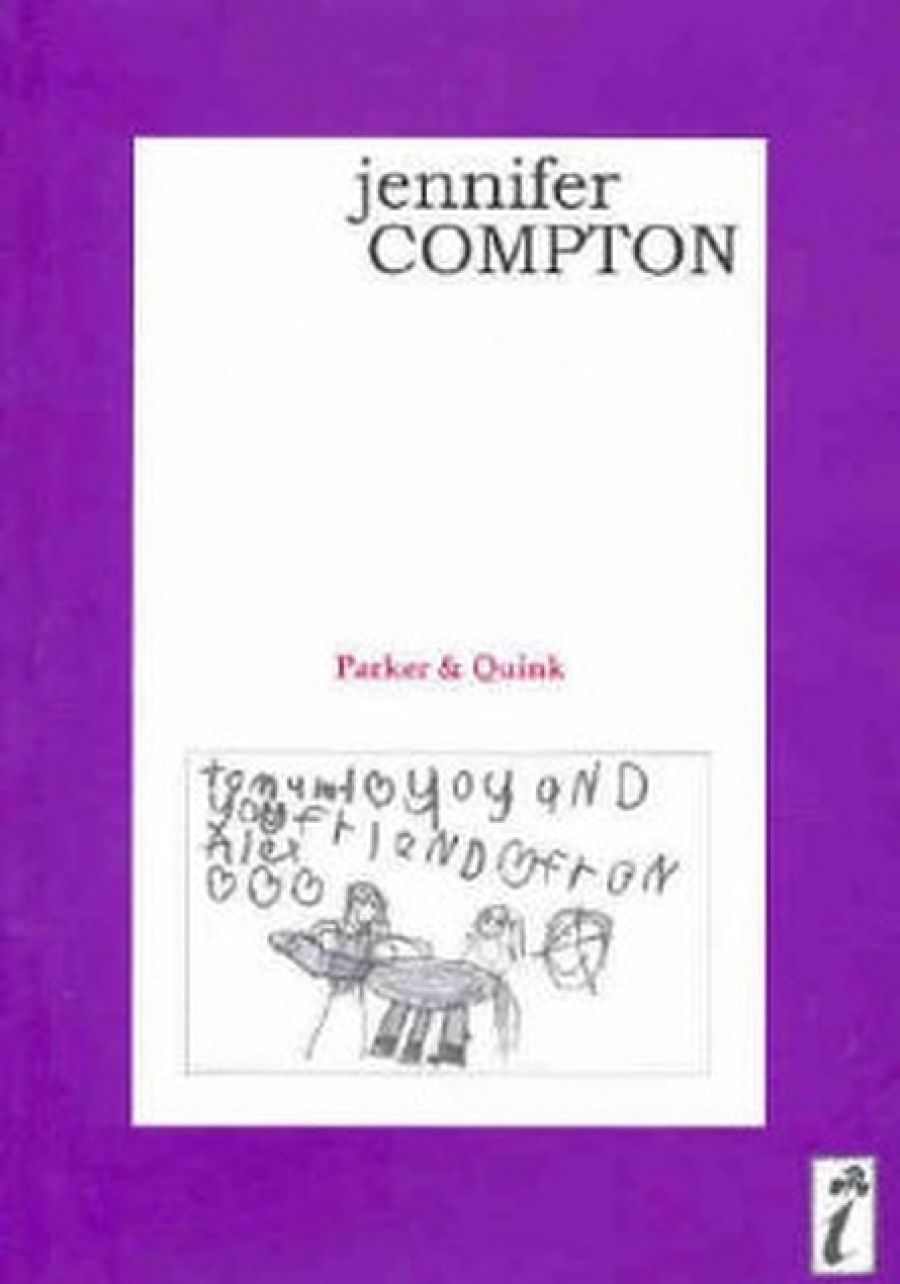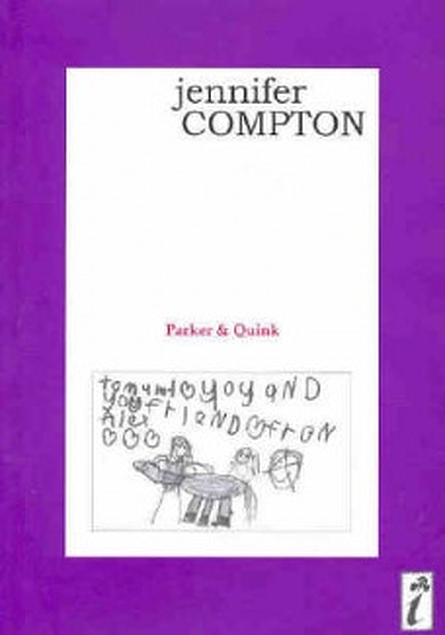
- Free Article: No
- Contents Category: Poetry
- Review Article: Yes
- Article Title: Close to the Bone
- Online Only: No
- Custom Highlight Text:
Jennifer Compton creates uneasy feelings. Her monologues come from desperate people: frantic, locked out, locked in. They all have some secret and are going to tell us, if it takes subtlety or no subtlety. What saves their querulous, impossible concerns from turning into rants or whinges is Compton’s actorly control of voice. These are poems of original intent and purposive control. The shocking ideas at the centre of her poems are tempered by a voice trying to master the extreme reality they relate. Her dramatic proclivities inform her work at every tum: characters are usually in places they don’t want to be, new circumstances have to be negotiated with an old map of the mind. On occasion, Compton even writes directions straight into the verse (‘I’ll shift from my mother’s voice and just give you the gist’), an unashamed member of theatre workshops.
- Book 1 Title: Parker & Quink
- Book 1 Biblio: Indigo, $18 pb, 65 pp
- Book 1 Cover Small (400 x 600):

- Book 1 Cover (800 x 1200):

- Book 2 Title: The Yugoslav Women and Their Pickled Herrings
- Book 2 Biblio: Cornford Press, $19 pb, 90 pp
Black humour is the favoured medium and the reader is left to decide which shade of black is now on display. The title poem (and shortest) of the collection puts this syndrome well: ‘To write your email address / with a fountain pen filled with ink / like lighting a candle on the moon.’ This calmly implies concerns that elsewhere are said less than calmly. Words need to say something, anything, everything. With this comes a corresponding dread that words cannot succeed, that between me and you is a gap that even words cannot cross, that words may only make worse. As is written in ‘During the Power Cut I Read, by Candlelight, “Ballade” by Kenneth Koch’:
At the age of 21
I bent
to find out what words meant.
I had to
to find out what the words meant.
The Beckettian modus operandi of most of Compton’s work is not apparent, however, in the most disturbing and difficult poem here, which is titled ‘Imposing the Chat’. The fun turns very nasty, but as a serious work that raises suppressed questions about how Australians relate to one another and the land, this is one poem you ought to confront.
To contrast these two collections raises a question that faces poet and readers alike. A century of refinement of the personal voice places us in a certain relationship to the maker of individual experience on the page. Compton turns trauma and disturbance into startling narratives and bravura art, while Cathy Young turns hard-won experience into shared narratives that depend for their success as much on identification as artistry. With Compton, we can never be sure how much the poems speak of her experience (they sit at odds with her comfy biography in the back); with Young, it is crucial to the poem’s effect that we believe every word. One Compton persona ruminates, ‘I can read the Australians, / some with an Asian cast of feature. Some not.’ – a hesitancy we would not expect from Young. Compton’s first person is a trickster; Young’s relies on our sympathetic trust.
In tum, this question influences how we read both poets. Compton writes of a world in which the rules of engagement are unclear and, more than likely, dysfunctional. For Young, there are two sets of rules, those set by society and those that working women know in order to survive. The subtitle tells the story of Young’s poetic project (Some Hard-Working Women Poems 1960-2000, SA & Victoria), an effort of memory and experience close to the bone. The results are a social exposé of class, a combination of ordinary speech and everyday facts made into tough language incidents. Young continues the line of Australian work poems championed by Overland and 925 Magazine: individual voice, explicit description of the workplace, a high value on labour, and a clear view of the injustices of the employer-employee relationship. This is life without illusions, a raw encounter with survival that society prefers to keep anonymous.
Young has seen it all and done it all, the hard way. In ‘banded and bagged and sealed and boxed’ she recounts the repetition of a paper plate factory, ‘down a lane off a back street / through a doorway’, where women worked arduous hours in ‘a waking prison’, the one incentive ‘5 bucks more a week how could she refuse?’ The studied (in any other review they would be called Heaneyesque) opening lines of ‘So what was it like (in the home)?’ – ‘It was the raw heat of ironing room presses / not giving the cool of summer morning / a chance to breathe as you walked through’ – are swamped by her true voice breaking in to articulate the pained frustration of coarse routine – ‘passing left stoked up to boiling-industrial / washing machines right drying room cabinets’ – onward through a massive list of unpaid jobs, noisy conditions, and personal crises that lead inexorably to thoughts of escape, ‘feet running the driveway / crunch-crunch-crunch-crunch’.
Other times, even escape is left out as Young pushes daily inevitability to its limits. Her stories, many of them more like testimonies or testaments, succeed most when there is least irony. Indeed, the accumulated details of these women’s lives, spoken with a level-headed direct speech, rely on a minimum of literary arrows for their effects. She gives basic dignity to her subjects and veers right away from pathos. It is this last achievement that makes for heightened credibility.
The poetry is heard in the patterns of daily grind: unimaginative schooling, thankless factory jobs, single motherhood. It comes over in the small intimacies, usually unexpected, that break into the relentless automated behaviour of low-paid jobs. The poetry makes itself heard in plain English statements, summaries of hard-earned philosophy. ‘Fashion Statements’, for example, a long list of 1960s Adelaide dress sense, perfume and make-up, concludes with the line, ‘it was all happening down Elizabeth way’.
For me, there are two potential pitfalls in such poetry. The first is the danger of victimhood. Generally, Young is too worldly-wise, even sassy, to indulge in ‘poor pitiful me’; her bad-humoured attitudes are a positive and a form of quality control. There are times, though, when the shared experience is okay, but is there anything else going on? The second is the weakness of such free-form exposition being no more than a job description. Sections of ‘Sleazy Jobs’ (‘Foxy boxer’, ‘Lap dancer’, ‘Pro’), for example, supply just enough facts for us to understand their demeaning nature. Perhaps that’s all the poet needs to say, but Young’s own speaking voice and the performance feel of the writing are somehow missing on the printed page. They are in danger of being sociology rather than epiphany. What comes across everywhere is work as intrinsic to living, something given special note in the excellent small poem ‘On Being Unemployed’: ‘I am a sequence / waiting to happen / a history wanting / to begin / like a song without words or / a tune without a beat / a static sequence.’


Comments powered by CComment